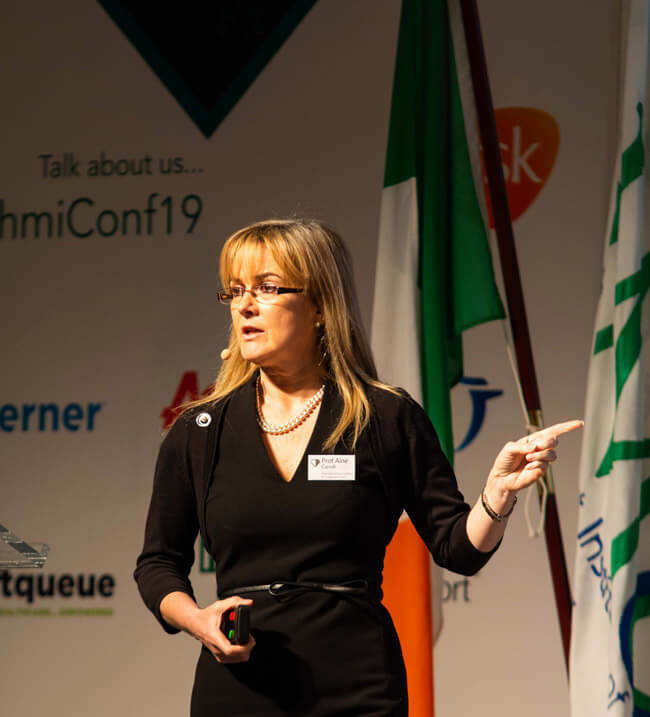Ten per cent of the population used seventy per cent of acute hospital and community prescribing resources and seventy-seven per cent of bed days, Prof. Áine Carroll, Professor of Healthcare Integration and improvement at UCD/NRH and Co-Director, the International Foundation for Integrated Care (IFIC) Ireland, said when she addressed the Conference.

She was speaking on “Ireland’s journey towards integrated care.”
Prof. Carroll said that health system challenges in Ireland included emerging demands, the double burden of disease and multimorbidity, unhealthy behaviour and lifestyle choices, greater citizens’ expectations, increased need to self-manage care and the need for cost efficiency and accountability.
Systems constraints included lack of community engagement and empowerment, inefficient and misaligned financing, a sub optimal health workforce, service fragmentation and inappropriate service delivery model and limited intersectoral action.
She said Slaintecare provided for a changing model of care, moving from the acute services to home care and community care. Home care included healthy independent living, chronic disease management, GP, assisted living and specialty pharmacy. Community care included long-term residential nursing care, step-up/step-down care and primary care centres.
The Clinical Strategy and Programmes Division of the HSE was already driving the changing model of care, shifting the emphasis from the hospital to the community.
The Clinical Care Programmes had a quadruple aim – to provide improved outcomes, better clinician experience, lower costs and improved patient experience.
Over 30 National Clinical Programmes had been established since 2010. The National Clinical Programmes had a direct impact on the way healthcare was delivered, and through better use of resources and had been transformative for patients.
“The National Clinical Programmes have been amazing. Patients and staff have got a better experience of care. In Ireland, we are hospital obsessed. If we want to do something to transform our systems, we will give community primacy, otherwise we will be in groundhog day over and over again.”
Prof. Carroll said that despite the amazing results for patients delivered by The National Clinical Programmes, the public perception of the health services remained negative. She thought the media had an obligation to provide a balanced view.
With an integrated approach, the National Clinical Programmes could deliver even better patient centric models of care. Challenges to implementation of National Clinical Programmes in Ireland were resources, resistance to change, data and information systems and changing the model of care.
Prof. Carroll said integrated care, as a concept, was an imprecise hodgepodge. Its meanings were as diverse as the numerous actors involved.
Kodner 2009 – International Foundation for Integrated Care had given the following definition: “Integrated care is essential to sustaining our health systems. It is a multi-level, multi-model, demand driven and patient-centred strategy designed to address complex and costly health needs by achieving better co-ordination of services across the entire care continuum. Not an end in itself, integrated care is a means of optimising system performance and attaining quality patient outcomes While there was growing consensus that high performing healthcare organisations could not do without health system integration in order to meet changing patient needs and community expectations, there was much less agreement on the best ways to accomplish the goal of integrated care.
Despite the amazing results for patients delivered by The National Clinical Programmes, the public perception of the health services remained negative.
A definition of person centred co-ordinated care in Ireland had been given as one that “provides me with access to and continuity in the services I need when and where I need them. It is underpinned by a comprehensive assessment of my life and my world together with the information and support I need. It demonstrates respect for my preferences, building care around me and those involved in my care.
Prof. Carroll said that the International Foundation for Integrated Care (IFIC) Ireland, was involved in supporting the development of specific measures and indicators that might be used in the ongoing monitoring and evaluation of specific programmes of integrated care.
“IFIC has an Irish hub. Our role was created to help you and front line staff make the changes you need to make for integrated care.
“IFIC maintains a research faculty that works with partners on large scale research projects (e.g. funded by the EU) as well as specific commissions,” she said.
“IFIC provides essential skills courses, webinars, short courses and workshops, postgraduate courses and Masters modules, summer schools and accelerated learning and study tours and exchange programmes.
“IFIC has an Irish hub. Our role was created to help you and front-line staff make the changes you need to make for integrated care. You can join at any time. We can organise study tours in Ireland, Europe and elsewhere in the world. We have a range of special interest groups, which will enable you to tap into international expertise.”

